Concrete pistol - pneumatic, gas, powder nayler
Anyone who has come across the work of attaching any elements to a concrete surface knows how difficult this process is. Most often, work is carried out using a perforator: the holes of the desired depth are drilled, the dowel is inserted and hammered or wrapped with a screwdriver. A gas mounting gun for concrete and its pneumatic or powder analogs are very rarely found on the construction site, while their use greatly simplifies and speeds up the work.
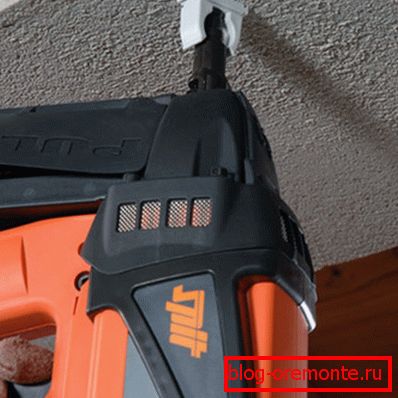
Benefits of using punching equipment
If we compare this option with a conventional hammer, we can single out a number of indisputable advantages:
| Accuracy | In contrast to the drilling process in the process of dust does not form, and does not appear chipped on the surface |
| Ease | Anyone who has worked with a puncher knows how much time and effort this process takes. Neiler allows you to hammer a nail into the concrete structure in a split second |
| Simplicity | For work, one person is enough; servicing and recharging are extremely simple. |
| Performance | The speed of work increases tenfold, which is very important for large volumes and limited time. |
| Security | As practice shows, the observance of elementary safety rules guarantees the absence of injuries. |
In fact, the advantages are much greater, and we have touched only the most important of them. Of course, there are some drawbacks, but we will consider them when describing each of the equipment options. The only noticeable minus is the high price, but any professional tool costs considerable funds, and at the expense of performance you will quickly compensate for the costs of acquisition.
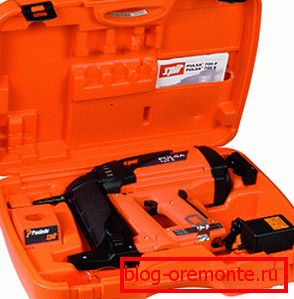
Types of assembly guns for concrete
There are many different types of tools on the market, but not all are suitable for working with such durable material as concrete. Most commonly used are three main types, each of which we will consider in this chapter.
Pneumatic nailers
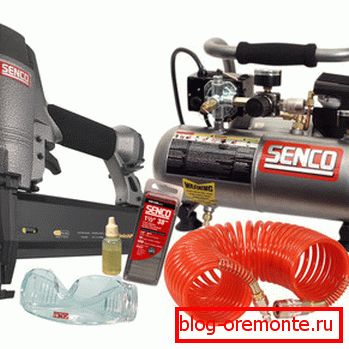
Without a doubt, this option is the most common and popular among professionals. A huge number of variations allow you to choose the optimal solution for any type of work.
Of the advantages are the following factors:
- Very simple design ensures high instrument reliability.. The principle “the simpler, the more reliable” is implemented in the equipment in full: all the nodes are durable, they perfectly resist wear.
- Pneumatic pistol on concrete provides a very high speed of work and allows you to perform a large amount of fastening operations in a very short time.
- The equipment is quite compact, its size is often not more than the usual perforator.
Note! The cost of one shot is one of the lowest among all the options, because you do not need to buy cartridges or gas cartridges.
- Simple operation and maintenance manual, almost any person will cope with it, having just got acquainted with the manual, without effort will master features of work.
- A very important factor is the possibility of using the tool in confined spaces, in humid and even explosive environments where other options are unlikely to work..
- Low impact and moderate noise during the work.
- The most democratic cost among all options.
There are some disadvantages:
- A compressor is required for operation.
- Unable to work without electricity.
- Hoses through which compressed air is supplied sometimes interfere with operation.
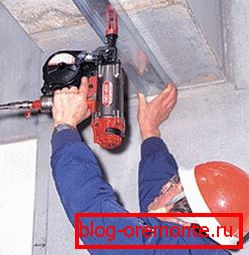
Gas neilers
Such a concrete pistol is distinguished by high mobility and autonomy; its work uses the energy of an explosion of an air-gas mixture, which pushes the piston.
The following advantages of such options can be highlighted:
- Powerful modifications allow you to work on even the most solid foundations.
- You do not need to press the device strongly against the wall, everything is quite easy and does not require the expenditure of effort, we can say that this is the most preferable option if you work with your hands.
- The ergonomics of the instrument and its rather small weight and volume make the work very convenient.
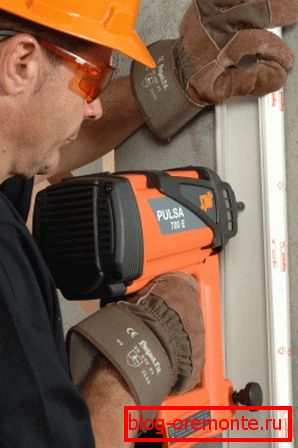
- You do not need any special operating permits, it simplifies the work in construction organizations, which often require a lot of papers.
- Maintenance and operation are quite simple and will not cause difficulties.
Among the shortcomings we note the following factors:
- In the course of work exhaust gases are formed, therefore, when working indoors, its ventilation is required.
- The need for periodic cleaning of the combustion chamber.
- Higher cost compared to other options.
Powder guns
This option is widely used in Soviet times. The principle of operation is similar to a firearm: energy is created by a special cartridge, which is selected in accordance with the hardness of the base.
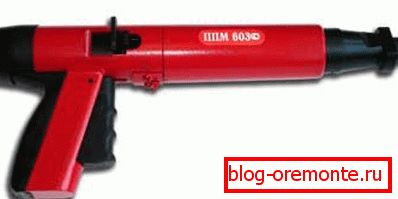
Of the benefits are the following:
- The high power of the equipment, allowing to carry out installation practically on any bases.
- Work does not require electricity or gas, only cartridges are needed.
- Low weight and compact dimensions simplify the workflow.
- A huge selection of nails for any purpose. (See also the article Screws for Concrete: Features.)
This option has disadvantages:
- To work you must have a special permit.
- Cartridges cost quite a lot.
Note! It should be borne in mind that periodic cleaning and replacement of high-wear parts is necessary.
Conclusion
The choice of one or another option depends on the specifics of the work and financial possibilities; it is important to choose the best option. The video in this article will tell you some features of equipment operation.